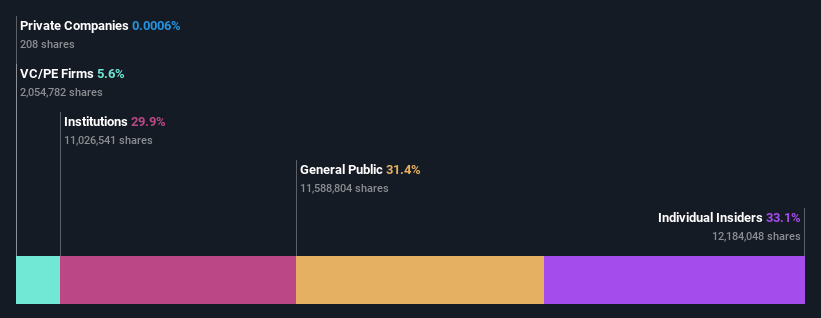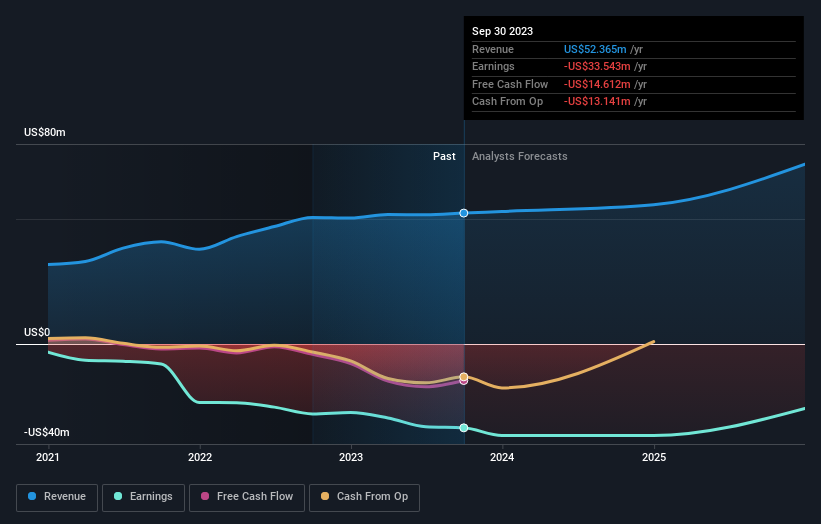Despite recent sales, Arteris, Inc. (NASDAQ:AIP) insiders remain the largest stockholders with 33% ownership
Key Insights
Arteris' significant insider ownership suggests inherent interests in company's expansion
A total of 8 investors have a majority stake in the company with 51% ownership
If you want to know who really controls Arteris, Inc. (NASDAQ:AIP), then you'll have to look at the makeup of its share registry. We can see that individual insiders own the lion's share in the company with 33% ownership. Put another way, the group faces the maximum upside potential (or downside risk).
Despite recent sales, insiders own the most shares in the company. As a result, they stand to gain the most after the stock gained 15% in the past week.
In the chart below, we zoom in on the different ownership groups of Arteris.
See our latest analysis for Arteris
What Does The Institutional Ownership Tell Us About Arteris?
Institutions typically measure themselves against a benchmark when reporting to their own investors, so they often become more enthusiastic about a stock once it's included in a major index. We would expect most companies to have some institutions on the register, especially if they are growing.
As you can see, institutional investors have a fair amount of stake in Arteris. This implies the analysts working for those institutions have looked at the stock and they like it. But just like anyone else, they could be wrong. It is not uncommon to see a big share price drop if two large institutional investors try to sell out of a stock at the same time. So it is worth checking the past earnings trajectory of Arteris, (below). Of course, keep in mind that there are other factors to consider, too.
Hedge funds don't have many shares in Arteris. Looking at our data, we can see that the largest shareholder is the CEO Karel Janac with 28% of shares outstanding. For context, the second largest shareholder holds about 5.6% of the shares outstanding, followed by an ownership of 4.2% by the third-largest shareholder.
We also observed that the top 8 shareholders account for more than half of the share register, with a few smaller shareholders to balance the interests of the larger ones to a certain extent.
While studying institutional ownership for a company can add value to your research, it is also a good practice to research analyst recommendations to get a deeper understand of a stock's expected performance. Quite a few analysts cover the stock, so you could look into forecast growth quite easily.
Insider Ownership Of Arteris
The definition of company insiders can be subjective and does vary between jurisdictions. Our data reflects individual insiders, capturing board members at the very least. The company management answer to the board and the latter should represent the interests of shareholders. Notably, sometimes top-level managers are on the board themselves.
Most consider insider ownership a positive because it can indicate the board is well aligned with other shareholders. However, on some occasions too much power is concentrated within this group.
Our information suggests that insiders maintain a significant holding in Arteris, Inc.. Insiders own US$73m worth of shares in the US$221m company. We would say this shows alignment with shareholders, but it is worth noting that the company is still quite small; some insiders may have founded the business. You can click here to see if those insiders have been buying or selling.
General Public Ownership
With a 31% ownership, the general public, mostly comprising of individual investors, have some degree of sway over Arteris. While this group can't necessarily call the shots, it can certainly have a real influence on how the company is run.
Private Equity Ownership
Private equity firms hold a 5.6% stake in Arteris. This suggests they can be influential in key policy decisions. Some might like this, because private equity are sometimes activists who hold management accountable. But other times, private equity is selling out, having taking the company public.
Next Steps:
While it is well worth considering the different groups that own a company, there are other factors that are even more important. Case in point: We've spotted 4 warning signs for Arteris you should be aware of.
If you would prefer discover what analysts are predicting in terms of future growth, do not miss this free report on analyst forecasts.
NB: Figures in this article are calculated using data from the last twelve months, which refer to the 12-month period ending on the last date of the month the financial statement is dated. This may not be consistent with full year annual report figures.
Have feedback on this article? Concerned about the content? Get in touch with us directly. Alternatively, email editorial-team (at) simplywallst.com.
This article by Simply Wall St is general in nature. We provide commentary based on historical data and analyst forecasts only using an unbiased methodology and our articles are not intended to be financial advice. It does not constitute a recommendation to buy or sell any stock, and does not take account of your objectives, or your financial situation. We aim to bring you long-term focused analysis driven by fundamental data. Note that our analysis may not factor in the latest price-sensitive company announcements or qualitative material. Simply Wall St has no position in any stocks mentioned.


